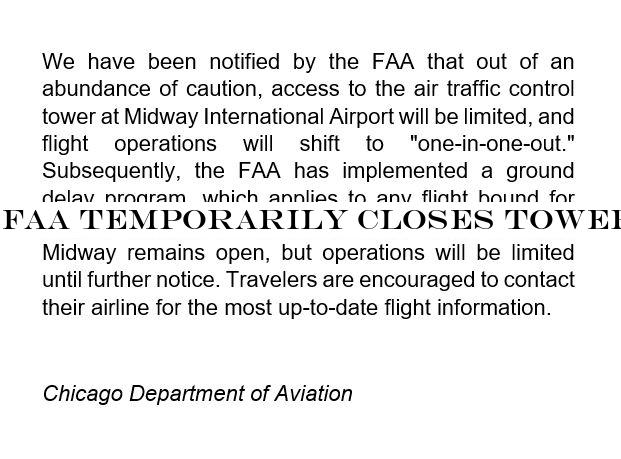Music
Trailers
DailyVideos
India
Pakistan
Afghanistan
Bangladesh
Srilanka
Nepal
Thailand
StockMarket
Business
Technology
Startup
Trending Videos
Coupons
Football
Search
Download App in Playstore
Download App
Best Collections
Technology
In another example for the farreaching effects of the coronavirus outbreak, the FAA today said that it is temporarily closing the tower at Midway Airport, the second largest airport in the Chicago area. In a statement, the FAA says that that several technicians at the facility tested positive for COVID-19. For a while, there was a ground stop in effect for Midway and no flights could take off to land at the airport.
In its statement, FAA notes that the airport remains open and that operations will continue at a reduced rate.
&The air traffic system is a resilient system with multiple backups in place. This shift is a regular execution of a longstanding contingency plan to ensure continued operations. Each facility across the country has a similar plan that has been updated and tested in recent years,& the FAA says in a statement. How exactly the airport will operate without a working control tower is unclear, though. Smaller airports often revert to being uncontrolled fields after the tower closes at night and have procedures in place for this. Thatnot typically the case for large airports like Midway, though, which are staffed 24/7.
Update (4:55pm PT): the airport has now clarified how it will keep the tower staffed.

The largest airline at Midway is Southwest Airlines, though Delta Air Lines also flies there.
In a separate statement, the National Air Traffic Controllers Association, the labor union for aviation safety professionals, asks that all who work at the tower should be tested for the disease. &NATCA is adamant that the testing must occur immediately and is hopeful there will be no additional COVID-19 infections. We are encouraged that the FAA is pursuing the rapid testing of all personnel at [Midway] Tower,& the organization writes.
- Details
- Category: Technology Today

Hello TechCrunch friends and family, tomorrow morning at 9 am Pacific Time we&re gathering on Zoom for an in-depth chat about our favorite startups from the latest Y Combinator Demo Day. This yearinstallment of the twice-yearly startup event happened yesterday, a week early and online only.
Like many other things, Demo Day was adapted to a new format in the face of COVID-19 disruptions. Despite that, TechCrunch wrote a host of posts on the companies that presented (you can see our notes here), dug into a number of the startups individually (here and here, for example), and sat down with Y CombinatorCEO for an interview.
We&re wrapping all of that with a group chat about the entire affair. We&d host this from the office in more regular years, but, it2020, and so we&re all gathering on Zoom which means that everyone is invited to listen in.
Here are the details:
- What? TechCrunch team chat about YC 2020 and all the coolest companies
- When? 9 am Pacific Time
- How long? About 30 minutes, give or take
- Where? Here, on Zoom
- Should I not mute myself and annoy everyone tuned in? No, please mute yourself
We&re recording the chat, and plan to make it available to Extra Crunch subscribers shortly after we&re done. But the main call is open to everyone, so add it to your calendar and we&ll see you there.
- Details
- Category: Technology Today
Read more: Join TC tomorrow at 9 am PT for a chat about the latest YC startup batch
Write comment (91 Comments)
Fox Corp., the broadcast news and entertainment company holding what remains of the Murdoch Familytelevision and cable sports and media assets after the sale of 21st Century Fox to Disney, has agreed to acquire the streaming service Tubi TV for $440 million.
Tubi, once of a now-dwindling number of free ad-supported streaming services, will bring a new digitally native consumer offering to Fox with younger-skewing audience that consumes roughly 160 million hours of entertainment on the platform, according to a statement.
Available on over 25 digital platforms in the U.S. and featuring 20,000 titles and 56,000 hours of film and television from 250 content partners — including major studios — will now be able to pull from Foxstable of news and sports programming in addition to all that licensed television and film.
Fox said that it will integrate its digital advertising, direct-to-consumer features, and personalization technology into Tubiadvertising platform. Fox watchers can now expect to see a deluge of Tubi ads flood their appointment watching of Neil Cavuto and Fox and Friends.
&Tubi will immediately expand our direct-to-consumer audience and capabilities and will provide our advertising partners with more opportunities to reach audiences at scale,& said Fox Corp. chief executive, Lachlan Murdoch in a statement. &Importantly, coupled with the combined power of Foxexisting networks, Tubi provides a substantial base from which we will drive long-term growth in the direct-to-consumer area.&
Tubichief executive, Farhad Massoudi, will continue to lead Tubiefforts and said that Foxrelationships with advertisers and distributors would be a big boost to the companygrowth.
Fox is paying for the Tubi acquisition with money earned from its sale of the 5 percent stake it held in Roku — another ad-supported streamer. The company said it was basically exchanging a passive minority investment in Roku for full ownership and control of a leadership position in the free ad-supported streaming market.
It&ll be interesting to see how Fox adjusts programming on the service which primarily comes from Warner Bros., Paramount, Lionsgate and NBCUniversal .
With the acquisition, Fox becomes the second big old-line network to buy into the ad-supported streaming business. In January, Viacom bought the streaming service PlutoTV for $340 million.
Fox was advised by Allen - Co. on the deal, while Qatalyst Partners served as Tubisole financial adviser.
- Details
- Category: Technology Today
Read more: Fox gets deeper into streaming with $440 million acquisition of Tubi
Write comment (91 Comments)
Hereanother edition of &Dear Sophie,& the advice column that answers immigration-related questions about working at technology companies.
&Your questions are vital to the spread of knowledge that allows people all over the world to rise above borders and pursue their dreams,& says Sophie Alcorn, a Silicon Valley immigration attorney. &Whether you&re in people ops, a founder or seeking a job in Silicon Valley, I would love to answer your questions in my next column.&
&Dear Sophie& columns are accessible for Extra Crunch subscribers; use promo code ALCORN to purchase a one or two-year subscription for 50% off.
Dear Sophie:I sent my startup team home to work remotely for several weeks. We have several folks on visas and work permits — am I supposed to do anything special for them? Can I proactively get visas for future employees to primarily work from home?
— Burrowing in Burlingame
Dear Burrowing,
- Details
- Category: Technology Today
Read more: Dear Sophie: How do I get visas for my team to work from home
Write comment (92 Comments)
The novel coronavirus pandemic has rapidly moved companies into a remote-first world.
Nearly all of the worldlargest events have been canceled, put on pause or pivoted to online-only. In the tech world, event cancellations thus far have included SXSW, GDC, Mobile World Congress, Google I/O, Facebook F8, E3 and others.
As more and more hosts consider staging fully remote events as possible alternatives, we decided to take a deeper look into the venture-backed startups focused on supporting large-scale virtual gatherings, like Hopin and Run The World. To further understand the impact of COVID-19, we asked five leading VCs who have invested in or have knowledge of startups focused on remote events to update us on the state of the market and to share where they see opportunity in the sector:
- Sarah Cannon, Index Ventures
- Connie Chan, Andreessen Horowitz
- Andrei Brasoveanu, Accel
- Ryan Kuder, Techstars Anywhere
- Paul Murphy, Northzone
Sarah Cannon, Index Ventures
Which trends in remote events/conferencing excite you the most from an investing perspective?
- Details
- Category: Technology Today
Read more: Where top VCs are investing in remote events
Write comment (95 Comments)A NYC-based startup that developed technology that extracts carbon dioxide from the air and combines it with water to create vodka has redirected its entire production capacity toward producing hand sanitizer, every bottle of which will be donated through collaboration with NYC officials, and potentially to local restaurants who employ delivery personnel providing critical service as social distancing and isolation measures continue.
Air Co. launched its vodka just last year, using a process it developed (which has received awards from NASA and XPrize) that is actually net carbon-negative. It involves pulling around one pound of carbon dioxide from the air which is then combined with water and turned into pure ethanol using solar-based renewable energy. Ethanol also happens to be the key active ingredient in hand sanitizer, which is generally between 60% and 95% alcohol in its most effective iterations.
Air Co.CEO and co-founder Gregory Constantine told me via email that because the company was founded on the basis of fulfilling a mission of social good, the startup wanted to find some way to help with community efforts to counter the ongoing coronavirus pandemic. It naturally turned to producing hand sanitizer made up 70% ethanol, its technologyprimary output.
The company isn&t looking to cash in on the current (ill-advised) panic-buying trends, which see supplies of hand sanitizer sold out or dwindling across major retailers and Amazon . Instead, even though itnow directing 100% of its production capacity to making hand sanitizer, italso donating all of the volume it produces.
While Constantine says that initially they&ve been producing smaller volumes than they&d like, and are looking at ramping production by shifting their methods, they&ve still managed to put out more than 1,000 50mL bottles, and will &continue to make 1,000 bottles per week and push supply as much as our technology allows us to.&
I asked Constantine how they&re figuring out who receives the hand sanitizer they&re donating, given the many possible parties who would appreciate this kind of charitable action.
&We&re going to be directly supplying all donations at the advice of the city,& he said. &We are also looking to work with local restaurants to have them provide food delivery drivers with our sanitizer given that bars and restaurants have had to shut their doors to patrons, leaving delivery services at the forefront of food services here in New York City.&
Given that they have shifted production away from their revenue-generating business for this effort, I also asked Constantine how long they plan to keep this up. Despite uncertainty about how long the need will exist, he said, they&re going to try to continue producing the sanitizer &for as long as [they] can.&
&We have shifted our production and are running on a very limited team to ensure that we are not furthering the spread of the virus in our efforts,& he added. &Every small piece of help from any person or business goes a long way in a time of need like this, and we plan to help however we can.&

- Details
- Category: Technology Today
Page 1185 of 1418

 19
19





